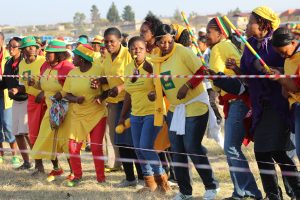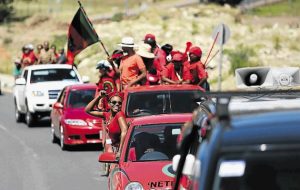By Mahao Mahao

DURING the final rallies on the Sunday leading to the 2015 National Assembly elections, a colleague told me he had done the rounds to assess the number of people who attended three political rallies: those of the All Basotho Convention (ABC), the Democratic Congress (DC) and the Lesotho Congress for Democracy (LCD).
Our interest was mainly focused on the ABC and DC rallies since the two had obviously emerged as the main contenders leading up to the polls. Some rather mocking pictures posted on social media of the LCD rally had already condemned the party as a competitor not to be taken seriously. Comparisons were made with their final rally in 2012 and this year’s which was hugely disappointing.
The subsequent announcement of the election results have depicted a party degenerating into a shadow of its former glory. No doubt the LCD is now a seriously wounded beast and all four legs are limping badly. They emerge from the election contest bruised, battered and humiliated, and may ultimately find it hard to rise from the ashes. A spectacular downward spiral can be extremely difficult to reverse. At some point in future, the LCD may unwillingly have to seek advice from the Basotho National Party on how they finally found a formula to revive their misfortunes.
Going back to the rallies, my colleague declared that in his observation, the ABC’s was the largest followed by that of the DC. We then tried to analyse what that could mean in terms of the possible outcome of the election results. I told him to exercise some caution as far as the two rallies were concerned.
Firstly, all the rallies were held in Maseru, an urban centre, where ABC supporters have a ubiquitous presence. I also brought to the colleague’s attention the fact that if ABC supporters were called to assemble – even at short notice – anywhere in Maseru (which isn’t that far from places like Berea, also with a huge ABC support-base) they would fill up the venue almost immediately.
Secondly, the DC’s main support, as previous (and this year’s) election results have demonstrated, now thrives on the peripheries of the main urban centres. This, therefore, means for many DC followers, a trip to a rally held at Ha Foso would be very long and physically taxing; one of the reasons they probably don’t bother due to the vast distances. It’s the kind of stress they simply cannot put up with even if transport is available for free. Although the ABC won three more constituencies than their main competitor, the fact they were pipped in the popular vote affirms that even if the DC’s support may not be that visible in the main urban-held rallies, the rugged terrain of Lesotho still harbours them in multitudes.
Now let us, for a moment, imagine something rather silly where a rural vote and an urban vote are given a price tag. Which one would fetch a higher price on the market? To be more precise, between Tom Thabane and Pakalitha Mosisili, who should be happier for getting more urban and rural votes respectively? Let us start by comparing the two sets of voters. This analysis does not, in any way, assume that all rural or urban voters have the same outlook but for a party to win a constituency, it has to be propelled to victory by the majority with a similar mindset; provided there is no rigging involved.

Starting with the rural voter, we see someone who is much simpler and therefore easier to please. Matters like free primary education, old age pension and a footbridge connecting two villages are usually adequate. Whether they lack jobs and cannot feed the same children who attend school for free is usually insignificant. Some will not even be able to judge the quality of the education on offer. Don’t forget, free primary education and old age pension came during Dr Mosisili’s previous 14-year reign and helped cement deep loyalty to him among the rural folks. They are also more gullible and most likely to cling to the congress and nationalist divide which some leaders enjoy propagating.
Confront some of them on what a real congress ideology is in contrast to a nationalist one and they (together with some of their leaders) will mumble something unintelligible. Remember also that the average rural voter is far less streetwise about events and systems elsewhere in the world to make an informed comparison with their own environment. If they spin in a circular movement, the horizon they see in front is all some of them are familiar with.
Insincere politicians also prey on the naivety of the rural voter. This is where all sorts of lies and propaganda can be spread. Any silly threat that free primary education and old age pensions will be stopped if they vote for a particular party is likely to send most rural voters into serious panic; clouding their judgment in the process.
The urban voter on the other hand is surrounded by an avalanche of information in the form of radio (not one but many stations), television, newspapers, internet and social media and more informed interactions among them. Most of them can tell the difference between fact and propaganda and can discern with ease whenever their leaders lie to them. These people can never be told that a computer “sees” who they vote for and can revoke their pensions if they tick the “wrong” symbol on the ballot paper. Even though some local radio stations are clearly one-sided, a smart urban resident can easily discern the bias and even mockingly laugh at the naivety of the presenters and those at the helm of such stations.
Besides being highly informed (and this is very important) the urban voters contribute the most in taxes to government coffers, mainly through Pay As You Earn (PAYE) and their vast purchasing power.
They are, therefore, much more critical and demanding and want a government that accounts for every cent as they know just how much they part with to enable government services to maintain their operations. They give their support when they think the government deserves it and can also withdraw it if they feel those governing them have gone off the rails. This explains why parties always first lose popularity in the urban areas.
Those who doubt what I am saying here should ask those government officials who – in 2006 – thought they could get away with stealing public cars at the ridiculous price of the cheapest laptop. The urban residents taught the then ruling party a hard-to-forget lesson and the deep political wounds inflicted after that still show no sign of healing, almost 10 years after the outrageous act. Many urban folks know too well the pain and sacrifice of servicing a car installment over many years and simply could not accept to maintain a business as usual approach when government officials made a joke out of a car purchase.
Urban folks are usually quick to react either negatively or positively to situations when factors necessitate such. If their leaders pay attention to their criticisms, such leaders can be professionally helped to improve their leadership skills and avoid many pitfalls on the usually bumpy road of politics.
As Simon Allison, The Daily Maverick’s Africa correspondent wrote after the election, the urban voters are closest to the government and can tell if it is or isn’t working. In other words they can tell if they are being governed properly.
This was in direct reference to the overwhelming support that Dr Thabane’s ABC has enjoyed in the urban centres. But at the end of the day, the rural voter (albeit with assistance from a consortium of seven parties) has had the last say in who ultimately assumes the reigns.
But whether rural or urban, all residents must enjoy equal rights, entitlements and citizenship of this country. Some of my friends and colleagues though, could not swallow the fact that their rural counterparts have an equal say in who governs them despite the fact they contribute more in taxes to help prop up delivery of services even to those rural areas whose tax base is so small. An extreme suggestion made out of frustration has been to physically slice Lesotho in half and allow the rural folks to choose their own preferred Prime Minister.
So, which vote is more expensive: rural or urban? You decide.
*Mahao Mahao is a lecturer in the Faculty of Education at the National University of Lesotho. The opinions expressed in this article are the author’s own and do not reflect the view of the Lesotho Times.


6 comments